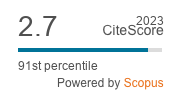Facing Fake News: The case of the students of the University of the Basque Country
DOI:
https://doi.org/10.26441/RC19.1-2020-A10Keywords:
fake news, students, university students, millennials, Z GenerationAbstract
The Internet and social networks have become the most attractive and accessible information channel for young people. Objectives. Examine the behavior of university students when facing fake news and their opinion on this phenomenon. Methodology. Semi-open surveys conducted mainly for Journalism students from the University of the Basque Country. In a second phase, the study was extended to students from other areas of knowledge. Results. Online media use is commonplace for university students and a high percentage of them confess to have been fooled by fake news on at least one occasion. Conclusions and discussion. The students consider they have a high rate of alert when facing fake news. There are some differences, according to the area of knowledge, of the subjects that they consider more invaded by the fake news.
Metrics
References
Alberto Notario, C. (2018). La generación del Milenio y su papel en el futuro de la inteligencia y la seguridad. En Nota de Futuro 1/2018. http://intranet.bibliotecasgc.bage.es/intranet-tmpl/prog/local_repository/documents/documents/20576_21824.pdf
Allcott, H. y Gentzkow, M. (2017). Social media and fake news in the 2016 election. En The National bureau of economic research. https://pubs.aeaweb.org/doi/pdfplus/10.1257/jep.31.2.211 DOI: https://doi.org/10.3386/w23089
Anderson, J., y Rainie, L. (2012). Millennials will benefit and suffer due to their hyperconnected lives. http://www.pewinternet.org/2012/02/29/millennials-will-benefit-and-suffer-due-totheir-hyperconnected-lives/
Babbie, E. (1999). Técnicas de la investigación social. Thompson.
Banaji, Sh., & Buckingham, D. (2013). The Civic Web. Young People, the Internet and Civic Participation. Cambridge, MA: The MIT Press. DOI: https://doi.org/10.7551/mitpress/8949.001.0001
Del Barrio, A. y Ruiz, I. (2017). Hábitos de uso del whatsapp por parte de los adolescentes. INFAD Revista de Psicología, Nº1, Monográfico 1, 23-30. DOI: https://doi.org/10.17060/ijodaep.2017.n1.v2.915
Berinsky, A. (2017). Rumors and health care reform. Experiences in political misinformation. Bristish Journal of Political Science, 47 (2): 241-262. DOI: https://doi.org/10.1017/S0007123415000186
Brandtzaeg, P., Folstad, A. & Chaparro, M. A. (2017). How Journalists and Social Media Users Perceive Online Fact-Checking and Verification Services. Journalism Practice, 12(9), pp. 1109-1129. https://doi.org/10.1080/17512786.2017.1363657 DOI: https://doi.org/10.1080/17512786.2017.1363657
Casero, A. (2009). Hacia la opinión pública 2.0. El Impacto del periodismo ciudadano sobre la esfera pública. En Medina, J., Rom, J.y Canosa, F. (eds). La Metamorfosis del espacio mediático. Trípodos.
Costera Meijer, I. (2007). The Paradox of Popularity; How Young People Experience the News. Journalism Studies, 8 (1), 96–116. DOI: https://doi.org/10.1080/14616700601056874
Deuze, M. (2005). Mediawork. Cambridge, MA: Polity Press.
Drok, N. y Hermans, L. (2016). Is there a future for slow journalism? Journalism Practice, 10 (4), 539-554. DOI: https://doi.org/10.1080/17512786.2015.1102604
Fernández Cruz, F. J. y Fernández Díaz, M. J. (2016). Los docentes de la generación Z y sus competencias digitales. Comunicar, Nº 46, 97-105. DOI: https://doi.org/10.3916/C46-2016-10
Fisher, C. (2016). The trouble with ‘trust’ in news media. Communication Research and Practice, 2(4), 451-465. DOI: https://doi.org/10.1080/22041451.2016.1261251
Foro Económico Mundial. (2017). Global Shapers Annual Survey 2017. Sharpers Survey 2017: http://www.shaperssurvey2017.org
Friggeri, A., Adamic, L.A. Eckles, D. and Cheng J. (2014). Rumor Cascades. Eighth International AAAI Conference on Weblogs and Social Media.
Gil, G. y Martínez, M. R (2001). Metodología de las Encuestas. En Navas, M.J. (Ed.). Métodos, Diseños y Técnicas de Investigación Psicológica. Madrid. UNED
Gottfried, J. & Shearer, E. (2016). News Use Across Social Media Platforms 2016. Pew Research Center. Journalism & Media. https://www.journalism.org/2016/05/26/news-use-across-social-media-platforms-2016/
Gottfried, J., & Barthel, M. (2015). How Millennials' political news habits differ from those of Gen Xers and Baby Boomers, Pew Research Center. https://www.pewresearch.org/fact-tank/2015/06/01/political-news-habits-by-generation/
Guerrero Pérez, E. (2018). La fuga de los millennials de la televisión lineal. Revista Latina de Comunicación Social, 73, 1231-1246. http://www.revistalatinacs.org/073paper/1304/63es.html DOI: https://doi.org/10.4185/RLCS-2018-1304
Hidalgo Pérez, A. A. (2017). Nuevo escenario en la gestión del capital humano. Harvard Deusto Business Review, 268, 36-47.
Jones, A. (2008). Losing the news: The future of the news that feeds democracy. Oxford University Press.
Laufer, P. (2011). Slow News; A Manifesto for the Critical News Consumer. Oregon State University Press.
Leahy, K., McGinley, J., Thompson, J., & Weese, T. (2011). Intelligence Community Assessment: Generational Difference in Workplace Motivation. Intelligence Reform and Transformation, 29(1), 1-16.
Lenhart, A., Purcel, K., Smith, A. & Zickuhr, K. (2010). Social Media and movil Internet use among teens and young adults. Pew Internet and American life. https://files.eric.ed.gov/fulltext/ED525056.pdf
López, A. (2011). Usos y actitudes de estudiantes universitarios futuros profesores sobre tecnologías de la información y la comunicación (TIC) y recursos sociales de internet. Questión, 31. http://sedici.unlp.edu.ar/handle/10915/34531
Magallón, R. (2016). El ADN de la Generación Z. Entre la economía colaborativa y la economía disruptiva. Revista de Estudios de Juventud, 114, 29-44.
Marchi, R. (2012). With Facebook, Blogs, and Fake News, Teens Reject Journalistic “Objectivity”. Journal of Communication Inquiry, 36(3) 246–262. DOI: https://doi.org/10.1177/0196859912458700
Parra, P. & Oliveira, L. (2018). Fake News: Una revisión sistemática de la literatura. Obserbatorio (OBS), Nº extra 1, 54-78.
Parreira do Prado, M. (2019). La proliferación de las “fake news” y sus algoritmos daña la cultura democrática. Ámbitos. Revista Internacional de Comunicación, 45, 89-106. DOI: https://doi.org/10.12795/Ambitos.2019.i45.06
Pariser, E. (2011). The filter of bubble. Penguin Books. DOI: https://doi.org/10.3139/9783446431164
Palomo, B. y Sedano, J. (2018). WhatsApp como herramienta de verificación de fake news. El caso de B de Bulo. Revista Latina de Comunicación Social, 73, 1384-1397. http://www.revistalatinacs.org/073paper/1312/71es.html DOI: https://doi.org/10.4185/RLCS-2018-1312
Pew Research Center (2014). Millennials in Adulthood: Detached from Institutions, Networked with Friends. Pew Research Center. http://www.pewsocialtrends.org/2014/03/07/millennials-in-adulthood/
Plazibat, I., Dadić, M., & Petričević, D. (2017). Do the millennials make a difference in retail?. Theory and Applications in the Knowledge Economy, 186. https://www.researchgate.net/publication/322686268_Organizational_Culture_and_Leadership's_Impact_on_a_Safety_Program_Change_Model
Spratt, H. E. & Agosto, D. (2017). Fighting fake news because we all deserve the truth: Programming idea for teaching teens media literacy. Young Adult Library Services, 15 (4), 17-21.
Schroer, W. (2008). Defining, Managing and Marketing to Generation X, Y and Z. The Portal, 10, https://s3.amazonaws.com/rdcms-iam/files/production/public/newimages/portalpdfs/2008_03_04.pdf
Visauta, B. (1989). Técnicas de investigación Social. I: Recogida de datos. Promociones y Publicaciones Universitarias.
Wells, N. (2015). Who are the Millennials Anyway? CNBC. http://www.cnbc.com/2015/05/22/who-are-the-millennials-anyway.html
Wineburg, S. & McGrew, S. (2016). What Students Don't Know About Fact-Checking. Education Week Vol. 36, Issue 11, 22-28. http://odl.gmu.edu/wp-content/uploads/Why-Students-Cant-Google-Their-Way-to-the-Truth-Education-Week.pdf











 Portal de Revistas de la Universidad de Piura.
Portal de Revistas de la Universidad de Piura.